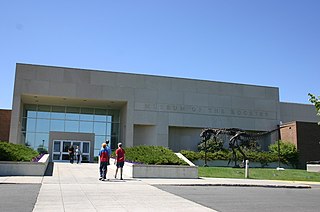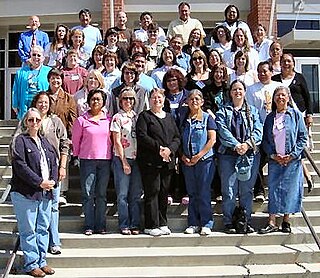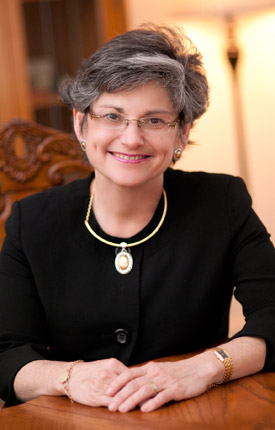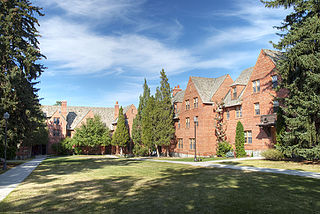History
In May 2014, Montana State University Library dean Kenning Arlitsch and University of Montana IT head and library system administrator John Greer proposed a unified content management system for Montana's academic libraries to the university's board of regents. The proposal was accepted unanimously. [1] That year, funding was requested from the Montana Legislature. [2] Although no legislative funding was awarded, the consortium officially launched in 2016 with the aims of increasing efficiency and improving access to resources for the students, researchers, and communities of Montana. [3] By negotiating with vendors for consortium members, TRAILS provides students and faculty with access to journals, databases, and other resources which might not otherwise have been affordable. [4] In addition to sharing resources and negotiating better prices for materials, in 2017 the consortium negotiated the purchase of the Alma cloud-based library-services platform from Ex Libris Ltd which increases efficiency and resource-sharing (allowing users to search 17 libraries in the system simultaneously). [5] TRAILS, with support from the Montana Office of the Commissioner of Higher Education, has initiated a statewide program for open educational resources (OER) program, such as free online textbooks. [6] The Northwest Commission on Colleges and Universities praised the Montana State University Library's leadership of the TRAILS program in 2017, [7] and the MSU Library was named the 2018 Library of the Year by the Montana Library Association. [8] The consortium consists of 24 institutions across the state. TRAILS includes all institutions in the Montana University System (MUS), the state's seven tribal colleges, and four private colleges. A memorandum of understanding was finalized by September 9, 2017, and operating procedures were approved on January 22, 2018. TRAILS is governed by a general council, which includes one representative of each institution. Officers include a chairperson and secretary, who serve two-year terms. Ex officio , non-voting representatives include the TRAILS coordinator and a representative of the Montana state librarian. Since the consortium's inception, its executive director has been Pamela Benjamin. TRAILS has five standing committees (collection development, digital preservation, OverDrive, open educational resources and professional development) and five technology sub-committees: cataloging, discovery, e-resources, fulfillment and resource sharing.

Montana State University (MSU) is a public land-grant research university in Bozeman, Montana. It enrolls more students than any other college or university in the state. MSU offers baccalaureate degrees in 60 fields, master's degrees in 68 fields, and doctoral degrees in 35 fields through its nine colleges. More than 16,700 students attended MSU in the fall 2019, taught by 796 full-time and 547 part-time faculty. In the Carnegie Classification, MSU is placed among "R1: Doctoral Universities – Very high research activity", one of only two universities to receive this distinction with a "very high undergraduate" enrollment profile. The university had research expenditures of $129.6 million in 2017.

Montana State University Billings (or MSU Billings) is a public university in Billings, Montana. It is the state's third largest university. Its campus is located on 110 acres in downtown Billings. Formerly Eastern Montana Normal School at its founding in 1927, the Normal School changed its name to Eastern Montana College of Education in 1949. It was again renamed in 1965 as Eastern Montana College (EMC). It merged into the Montana University System in 1994 under its present name. Currently, the university offers over 100 specialized programs for certificates, associate, bachelor's, and master's degrees through the university's five colleges. The five colleges of Montana State University Billings are Liberal Arts & Social Sciences, Business, Health Professions and Science, Education, and City College.
The Montana University System (MUS) was created on July 1, 1994, when the Montana Board of Regents of Higher Education restructured the state's public colleges and universities, with the goal of streamlining the state's higher education in the wake of decreased state funding. It has sixteen campuses divided among the two state university systems, and community colleges.

Museum of the Rockies is a museum in Bozeman, Montana. Originally affiliated with Montana State University in Bozeman, and now also, the Smithsonian Institution. The museum is largely known for its Paleontological collections as well as having the largest collection of North American Dinosaur fossils in the United States. They also possess the largest Tyrannosaurus skull ever discovered, as well as the thigh bone of a Tyrannosaurus rex that contains soft-tissue remains. The museum is part of the Montana Dinosaur Trail and is Montana's official repository for Paleontological specimens.

Bobcat Stadium is an outdoor athletic stadium in the western United States, located on the campus of Montana State University in Bozeman, Montana. It is the home of the Montana State Bobcats college football team of the Big Sky Conference.
Montana PBS is the PBS member public television network for the U.S. state of Montana. It is a joint venture between Montana State University (MSU) and the University of Montana (UM). The network is headquartered in the Visual Communications Building on the MSU campus in Bozeman, with a separate studio on the UM campus in Missoula.
The Ohio Library and Information Network (OhioLINK) is a consortium of Ohio's college and university libraries and the State Library of Ohio. Serving more than 800,000 students, faculty, and staff at 88 institutions with 117 libraries, OhioLINK's membership includes 16 public universities, 23 community/technical colleges, 48 private colleges and the State Library of Ohio. OhioLINK serves faculty, students, staff and other researchers via campus-based integrated library systems, the OhioLINK central site, and Internet resources.
The TexShare program is a statewide resource-sharing consortium of hundreds of member libraries in Texas, United States administered by the Texas State Library and Archives Commission (TSLAC). The TexShare program maximizes the effectiveness of library expenditures by enabling member libraries to share staff expertise, share materials electronic and print formats, pursue joint purchasing agreements on electronic databases, and encourage the cooperative development of Texas libraries statewide. TexShare is made up of Texas academic libraries, public libraries, and libraries of clinical medicine. TexShare is a member driven consortium that exists with the support and cooperation of Texas member libraries.

The Tribal College Librarians Institute (TCLI) is a week-long professional development experience for tribal college librarians from all over the United States and Canada, normally held in Bozeman, Montana.

Chief Dull Knife College is a public tribal land-grant community college on the Northern Cheyenne Indian Reservation in Lame Deer, Montana. It is an open-admission college with about 141 students. On average, more than half of its graduates move on to four-year colleges.

Tribal colleges and universities (TCUs) are a category of higher education, minority-serving institutions in the United States defined in the Higher Education Act of 1965. Each qualifies for funding under the Tribally Controlled Colleges and Universities Assistance Act of 1978 or the Navajo Community College Act ; or is cited in section 532 of the Equity in Educational Land-Grant Status Act of 1994.

Waded Cruzado is a Puerto Rican professor of Spanish language and Spanish literature. She served as Interim President of New Mexico State University from 2008 to 2009, and since 2010 has served as the 12th President of Montana State University in Bozeman, Montana.

Roland R. Renne was an American agricultural economics professor who served as President of Montana State College from 1943 to 1964. Renne was also active in Washington, D.C., and United States overseas agricultural economics work. He was the 1964 Democratic candidate for governor of Montana.
A library consortium is any cooperative association of libraries that coordinates resources and/or activities on behalf of its members, whether they are academic, public, school or special libraries, and/or information centers. Library consortia have been created to service specific regions or geographic areas, e.g., local, state, regional, national or international. Many libraries commonly belong to multiple consortia. The goal of a library consortium is to amplify the capabilities and effectiveness of its member libraries through collective action, including, but not limited to, print or electronic resource sharing, reducing costs through group purchases of resources, and hosting professional development opportunities. The “bedrock principle upon which consortia operate is that libraries can accomplish more together than alone.”

The Montana State University Library (MSU Library) is the academic library of Montana State University, Montana's land-grant university, in Bozeman, Montana, United States. It is the flagship library for all of the Montana State University System's campuses. In 1978, the library was named the Roland R. Renne Library to honor the sixth president of the university. The library supports the research and information needs of Montana's students, faculty, and the Montana Extension Service.
Michael Peter Malone was an American historian who served from 1991 to 1999 as the 10th president of Montana State University. One of Montana's preeminent historians and writers, he was named by both The Missoulian and the Great Falls Tribune newspapers as one of the 100 most influential Montanans of the 20th century. His Montana: A History of Two Centuries was called the "definitive history of the state" by the Bozeman Daily Chronicle.

The Jake Jabs College of Business & Entrepreneurship (JJCBE), previously known as the MSU College of Business is the business school of Montana State University, a public land-grant university located in Bozeman, Montana. The college offers a Bachelor of Science in Business degree at the undergraduate level and a Master of Professional Accountancy (MPAc) degree as well as a Master of Science in Innovation and Management (MSIM) at the graduate level. The college is named for MSU alumnus Jake Jabs, president and CEO of American Furniture Warehouse who donated $25 million in 2011 to the university to modernize the college.

The Honors College at Montana State University provides opportunities for students to study, conduct research, and exchange ideas in a challenging and supportive academic environment. In addition to learning from outstanding faculty members, honors students can attend special Honors seminars, take interdisciplinary Honors courses, and engage in independent study and research opportunities.

The Graduate School provides leadership in graduate education at Montana State University (MSU), a public land-grant university located in Bozeman, Montana.
Saginaw Chippewa Tribal College (SCTC) is a public tribal land-grant community college in Mount Pleasant, Michigan, United States. The college was established in 1998 by the Saginaw Chippewa Tribal Committee.













